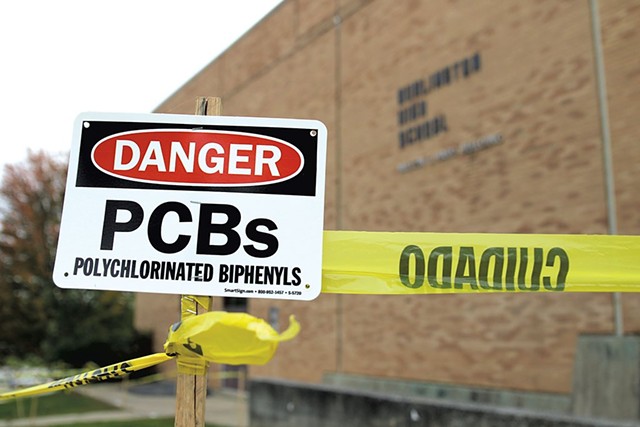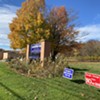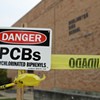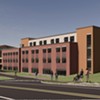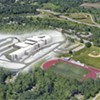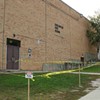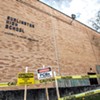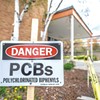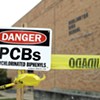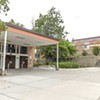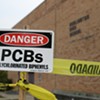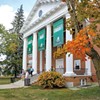Switch to the mobile version of this page.
Vermont's Independent Voice
- News
- Arts+Culture
- Home+Design
- Food
- Cannabis
- Music
- On Screen
- Events
- Jobs
- Obituaries
- Classifieds
- Personals
Browse News
Departments
Browse Arts + Culture
View All
local resources
Browse Food + Drink
View All
Browse Cannabis
View All
-
Business

Cannabis Company Could Lose License for Using…
-
Culture

'Cannasations' Podcaster Kris Brown Aims to 'Humanize'…
-
True 802

A Burlington Cannabis Shop Plans to Host…
-
Business

Judge Tosses Burlington Cannabiz Owner's Lawsuit
-
Health + Fitness

Vermont's Cannabis Nurse Hotline Answers Health Questions…
Browse Music
View All
Browse On Screen
Browse Events
Browse Classifieds
Browse Personals
-

If you're looking for "I Spys," dating or LTRs, this is your scene.
View Profiles
Special Reports
Pubs+More
Tuesday, May 4, 2021
Education / Environment Burlington School Board Votes to Abandon PCB-Contaminated High School
Posted By Alison Novak on Tue, May 4, 2021 at 10:20 PM
The Burlington School Board voted unanimously on Tuesday to terminate a $70 million high school renovation project, paving the way for plans to build a brand new building at a yet-to-be-determined location in the Queen City.
The board’s decision came after Superintendent Tom Flanagan recommended that the district halt the project because of widespread contamination from polychlorinated biphenyls (PCBs) on the high school campus.
“I feel strongly, after collaboration and consultation with my team and with our experts in this work, that it is no longer possible to meet our stated goals of the ReEnvisioning Project,” Flanagan told the board. “The PCB contamination and remediation that will be needed to address the contamination pushes us over the threshold of what is possible in this building, and I believe that we need to start fresh with a new build.”
Burlington voters approved a $70 million bond in November 2018 to undertake the extensive renovation of the city’s high school and technical center. As part of the project, the school district was required to perform environmental testing of the property.
Initial tests last September revealed elevated levels of PCBS in the school’s buildings, spurring the district to close the school for in-person learning before the semester even began. Last November, the district signed a three-and-a-half-year lease to occupy 67 Cherry Street, the site of a former Macy’s department store, while school officials figured out how to remediate the high school’s PCB problem. Students began learning in the temporary space, dubbed Downtown Burlington High School, in March.
 Flanagan said that more extensive PCB testing on the North Avenue campus has revealed PCB contamination in its concrete floors, window caulking, walls, ceiling, soil and air.
Flanagan said that more extensive PCB testing on the North Avenue campus has revealed PCB contamination in its concrete floors, window caulking, walls, ceiling, soil and air.
Even if the school district spends an estimated $7 to $12 million to remediate the PCBs, Flanagan said, it is unclear whether the building would meet the stringent state screening values for PCBs in schools. In 2013, the Vermont Department of Health recommended a concentration for PCBs in school air of 15 nanograms per cubic meter for all students and staff. The Environmental Protection Agency’s recommendation, meanwhile, ranges from 70 nanograms per cubic meter for children under 3 years to 600 nanograms per cubic meter for high school students.
Flanagan said that he feels strongly that there are viable sites to build a new high school, and urged school board members to act quickly. “The longer we wait to make this decision, the longer it takes to build,” he said.
Before voting, school board members expressed support for Flanagan’s recommendation.
“It’s time to cut the bait and cast again,” Commissioner Stephen Carey said.
Commissioner Monika Ivancic called Flanagan “brave” for recommending the termination of the project, but said the development was also “disappointing.”
“We’ve invested now years, and many dollars — I guess I’m not going to ask how many dollars,” Ivancic said. She said she hoped the district could take some of what they learned through this experience to inform its plans for a new high school going forward.
Commissioner Jeff Wick underscored the gravity of the situation.“This is the biggest event I’ve experienced in the last four or five years as a school board member,” Wick said. “This is not a small thing when we find ourselves with a condemned high school, and essentially a clock that’s ticking to get a new one in place.”
Director of finance Nathan Lavery explained the financial implications of abandoning the renovation project. He said that approximately $4 million of the $70 million bond had already been spent. In fiscal year 21, the district borrowed an additional $20 million in anticipation of more work on the project but did not spend it yet, so the money can essentially be given back.
Lavery added that even if the district abandons the North Avenue high school, it would still have to pay for cleaning up PCB contamination on the site.
“Our PCB problem does not go away by stopping the ReEnvisioning Project,” Lavery said. “There will be significant costs there.”
Several commissioners speculated that the state or federal government might help fund the construction of a new high school.
“I’m not 100 percent convinced that this will be on the backs of the Burlington taxpayers,” said Commissioner Martine Gulick. “I’m hoping that we can be creative, and that folks are going to support Burlington, which is the economic driver for Chittenden County and the state.”
The board’s decision came after Superintendent Tom Flanagan recommended that the district halt the project because of widespread contamination from polychlorinated biphenyls (PCBs) on the high school campus.
“I feel strongly, after collaboration and consultation with my team and with our experts in this work, that it is no longer possible to meet our stated goals of the ReEnvisioning Project,” Flanagan told the board. “The PCB contamination and remediation that will be needed to address the contamination pushes us over the threshold of what is possible in this building, and I believe that we need to start fresh with a new build.”
Burlington voters approved a $70 million bond in November 2018 to undertake the extensive renovation of the city’s high school and technical center. As part of the project, the school district was required to perform environmental testing of the property.
Initial tests last September revealed elevated levels of PCBS in the school’s buildings, spurring the district to close the school for in-person learning before the semester even began. Last November, the district signed a three-and-a-half-year lease to occupy 67 Cherry Street, the site of a former Macy’s department store, while school officials figured out how to remediate the high school’s PCB problem. Students began learning in the temporary space, dubbed Downtown Burlington High School, in March.
Related Burlington High School Opens Downtown Campus in Former Macy's

Burlington High School Opens Downtown Campus in Former Macy's
By Alison Novak
Off Message
Even if the school district spends an estimated $7 to $12 million to remediate the PCBs, Flanagan said, it is unclear whether the building would meet the stringent state screening values for PCBs in schools. In 2013, the Vermont Department of Health recommended a concentration for PCBs in school air of 15 nanograms per cubic meter for all students and staff. The Environmental Protection Agency’s recommendation, meanwhile, ranges from 70 nanograms per cubic meter for children under 3 years to 600 nanograms per cubic meter for high school students.
Flanagan said that he feels strongly that there are viable sites to build a new high school, and urged school board members to act quickly. “The longer we wait to make this decision, the longer it takes to build,” he said.
Before voting, school board members expressed support for Flanagan’s recommendation.
“It’s time to cut the bait and cast again,” Commissioner Stephen Carey said.
Commissioner Monika Ivancic called Flanagan “brave” for recommending the termination of the project, but said the development was also “disappointing.”
“We’ve invested now years, and many dollars — I guess I’m not going to ask how many dollars,” Ivancic said. She said she hoped the district could take some of what they learned through this experience to inform its plans for a new high school going forward.
Commissioner Jeff Wick underscored the gravity of the situation.“This is the biggest event I’ve experienced in the last four or five years as a school board member,” Wick said. “This is not a small thing when we find ourselves with a condemned high school, and essentially a clock that’s ticking to get a new one in place.”
Director of finance Nathan Lavery explained the financial implications of abandoning the renovation project. He said that approximately $4 million of the $70 million bond had already been spent. In fiscal year 21, the district borrowed an additional $20 million in anticipation of more work on the project but did not spend it yet, so the money can essentially be given back.
Lavery added that even if the district abandons the North Avenue high school, it would still have to pay for cleaning up PCB contamination on the site.
“Our PCB problem does not go away by stopping the ReEnvisioning Project,” Lavery said. “There will be significant costs there.”
Several commissioners speculated that the state or federal government might help fund the construction of a new high school.
“I’m not 100 percent convinced that this will be on the backs of the Burlington taxpayers,” said Commissioner Martine Gulick. “I’m hoping that we can be creative, and that folks are going to support Burlington, which is the economic driver for Chittenden County and the state.”
Tags: Burlington High School, PCBs, Web Only, Image
Comments
Comments are closed.
Since 2014, Seven Days has allowed readers to comment on all stories posted on our website. While we’ve appreciated the suggestions and insights, the time has come to shut them down — at least temporarily.
While we champion free speech, facts are a matter of life and death during the coronavirus pandemic, and right now Seven Days is prioritizing the production of responsible journalism over moderating online debates between readers.
To criticize, correct or praise our reporting, please send us a letter to the editor. Or send us a tip. We’ll check it out and report the results.
Online comments may return when we have better tech tools for managing them. Thanks for reading.
Related Stories
About The Author

Alison Novak
Bio:
Alison is the former managing editor at Kids VT, Seven Days' parenting publication and writes about education for Seven Days.
Alison is the former managing editor at Kids VT, Seven Days' parenting publication and writes about education for Seven Days.





























